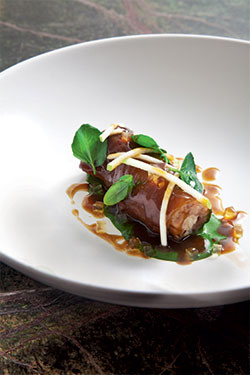Chapter One and The Tannery, Ireland

Roula Khalaf, Editor of the FT, selects her favourite stories in this weekly newsletter.
Chefs are often asked for their opinions on extraneous issues but rarely for their views on the economy. This may be an oversight, given their position at the fulcrum of supply and demand.
Conversations in the kitchens of Ross Lewis at Chapter One in Dublin, and Paul Flynn of The Tannery in Dungarvan (a two-hour drive south down the coast), after we had enjoyed excellent meals in both restaurants, soon turned to the challenges they are facing now that the Irish economy is improving.
The discussion in Chapter One got under way with an astute comment about the Irish in general. We had been joined by the columnist Sam Smyth and his partner, TV producer Angela Ryan. After being served a glass of Jean Thevenet’s 2007 Macon by the restaurant’s knowledgeable sommelier, Ryan commented: “We Irish are in one of only two states: it is either party on or party over, and there is really nothing in between.”
It was certainly “party on” in Chapter One’s basement dining room the Saturday night we were there. The various small rooms were humming; tables were being turned; and, most noticeably, a significant number of the guests were in their late twenties or early thirties.
This popularity is hard-earned. Lewis and his team have been there for more than 20 years and the restaurant runs like a well-oiled machine. The most obvious source of this pleasure is an extremely well-constructed menu: at dinner, four courses, each comprising four or five choices.

Bowls of smoked potato and buttermilk soup and creamed tapioca with ewe’s milk cheese and black truffles were two of the more comforting first courses. I thought I had made a mistake in not ordering the mallard with marinated Wicklow mushrooms as a second course – until I ate the first slice of the smoked haddock with crab mayonnaise and pickled Atlantic seaweed. This fish is smoked and cured by Helen Mulloy in Howth, while the seaweed is harvested by Manus McGonagle in Donegal. The result takes this often rather mundane fish to new heights.
The beauty of the main course that three of us then chose – black sole grilled over charcoal with salted grapes and shrimps from Castletownbere – lay not so much in its culinary technique but in its reminder of just how gentle and cheering this particular fish can be.
After a zingy mandarin dessert, I passed on my thanks to Lewis and asked him why there were so many young customers in his restaurant. “In a way they are the lucky ones,” he replied, smiling. “They were just graduating in 2008 when the recession hit and the banks had to stop lending, so these people could not take on any expensive loans. As a result they are in a position today to have a really good time.”
As commercial rents were now relatively low, he added, more new restaurants were opening, making recruitment difficult. As for so long in Ireland’s history, young people are drawn to Dublin for their initial training but then set off round the world. He hoped that as better times return, Dublin’s restaurants will be able to lure back more Irish chefs.
Lewis was possibly so incisive because he chooses to keep out of the limelight. Despite a long and distinguished career, his very first cookbook will appear only later this month. By contrast, Paul Flynn is well known to Irish TV viewers. His restaurant, 100m from the sea in a former tannery, is a clear expression of what a busy town Dungarvan used to be.
The waiting staff have to be pretty fit to carry every plate from the ground-floor kitchen up two flights of stairs to the dining room. There, strong natural light shows off strong natural ingredients: a crab “crème brûlée”, Flynn’s signature dish, for instance, or monkfish on the bone with a bouillabaisse sauce and a slice of local cheddar.
But it was round the corner that Flynn’s impact on the local economy was most obvious. A patch of wasteland, where kids used to get up to no good, is now a large vegetable and herb garden that supplies the adjacent cookery school he has established, where the 14 cooking stations for the students occupy what were two garages when the economy roared.
Whether it’s in relation to the economy, or what food is in season, these two chefs have their fingers firmly on the pulse.
More columns at www.ft.com/lander
‘Chapter One’, by Ross Lewis (Gill & Macmillan, £39.99)
——————————————-
Chapter One
18 Parnell Square, Dublin
+353 1 873 2266;
The Tannery
10 Quay St, Dungarvan
Co Waterford
+353 58 45420; www.tannery.ie
Comments